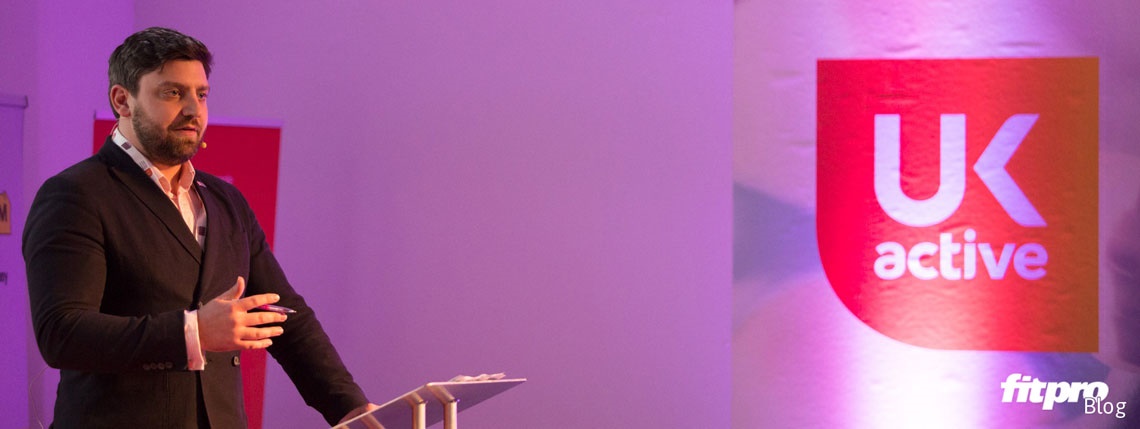On 2 March, FitPro attended ‘Sweat’ – a one-day, London-based workshop aimed at educating and empowering all those in the boutique fitness sector. The event was hosted by not-for-profit health body, ukactive.
Almost 250 fitness experts listened intently to multiple headline speakers to explore what has driven the boom in boutique fitness across London and beyond. Studio design was a point of interest and Hot Yoga Society founder, Olga Allon, argued that understanding your business and commercial capacity is vital, while Kyriakos Katsaros, principal of Studio C102, warned that you can’t squeeze a brand concept into an unsuitable space. Nightclub trends will continue within the UK and ‘how colour makes us feel’ will be what boutique studio owners need to explore when designing their functional space.
Richard Scrivener, product development manager at Train Fitness International, along with BOOM Cycle co-founder, Hilary Rowland, and co-founder of Bear Grylls Epic Training, Natalie Summers, discussed at length their trainer recruitment process and training methods. In relation to recruitment, Rowland said, “We always look for personality when hiring new trainers and then you have to teach the skills and values. You need to constantly nurture your trainers. At BOOM, we have a lengthy training process, we even take our trainers to acting classes, and no trainers have left BOOM in two years.” The audience was keen to find out how they kept hold of good trainers, and Natalie Summers told attendees that you need to bring trainers up through the ranks and give them more responsibility – “let them shine,” she said.
Richard Scrivener had different ideas and said, “Gyms need to look after their best coaches by rewarding them both financially and with education. Once the trainers are securing a vast number of sessions, they are clearly doing something right – you need to go out of your way to develop people and keep them within the club.” All panellists were in full agreement that educating staff was essential to maintaining a strong team and brand loyalty.
When analysing the boutique fitness industry, Scrivener said, “I think what the boutique fitness industry does really well is that it provides a framework for personal trainers. Most trainers who have only done a six-week training course and then go straight into a large health club will struggle. The most successful trainers are the ones who get the support structure, it takes someone pretty special to just do a personal training course and then go straight into a large health chain.”
Laughter filled the room when Barry’s Bootcamp spoke of individuals sussing out their offering by coming in and picking up their laundry bags for takeaway inspiration. The incredibly successful boutique doesn’t appear to let copycats bother them, though. The journalist Bangs also produced a ripple of laughter with her upfront and straight-to-the-point thoughts on why going to the gym should never be about weight loss. “I’ve got jingly hips, cellulite, and I’m good with it,” she told listeners. “Do it because you love it, do it because you don’t want to feel stressed out, don’t make it about white sandy beaches, do it because you want to do it.” It may sound obvious to some, but her frank comments on why she isn’t interested in calorie counting in indoor cycle sessions was refreshing – especially because of the web of lies plastered on social media.
For the data-driven individual, Running Heroes – the first reward platform for runners, which launched in 2014 in France – shared the current status of its product. James Poole, business development manager, said, “France is a very different market to the UK in terms of sophistication, and especially in terms of running. France doesn’t have the success that the UK has with Park Run. Most of the people on our Running Heroes platform aren’t running every week. We’re all interested in progress, whether it’s 1K, 5K or 50K; we like to know that we were a little bit quicker.” On the subject of wearable technology, he told people to embrace it as it’s not going anywhere and said people shouldn’t be fearful of it. “It’s going to be increasingly adopted, it’s still evolving, there’s plenty of time for companies to adopt it.”
Dame Tanni Grey Thompson, chair of ukactive, used the opportunity to address town planning laws that may be restricting the development of new fitness businesses. Thompson described the current planning laws as “archaic” and said Britain’s high streets are “drowning in a sea of betting shops, fried chicken joints and empty shop windows.” When talking of solutions, Thompson said, “Fitness operators breathe life and vibrancy into high streets.”
Research by the Royal Society for Public Health has found that ‘unhealthy high streets’ are often linked to high deprivation and ill health, with the North and Midlands said to be the worst affected areas. Its chair has called for an urgent rethink and said town planners must be given move power to tackle physical inactivity.







